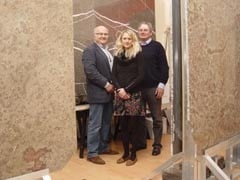It was the Romans who first appreciated the beauty of the hard, polishable limestones of the British Isles and used it in their mansions and temples. It is in deference to that provenance that Orlando Boyne has called his company Britannicus Stone as he makes Britain’s own ‘marmi’ commercially available again.
There is nothing more exquisite or exclusive than the polished stones of the British Isles. And now a rapidly growing range of them is being made available by a company called Britannicus Stone that has been established by Orlando Boyne with Roger Downing as Managing Director.
Britannicus was established with the idea of making British stone available to clients however they want it, with Britannicus having as much or as little input to the design, processing and installation as the customer requires.
“It’s us tailoring our services to what the clients want. Instead of us saying this is what we do, we are saying what would you like us to do,” says Roger Downing.
Britannicus launched with a range of 12 polished stones at Galleria, an art gallery just off Pall Mall, and plan to have twice that number available before this year is out.
The range currently available consists mostly of hard limestones, including Swaledale Fossil, Salterwath, Pooil Vaaish from the Isle of Man, Hopton Old White from the Beelow Beds, Eskett Black, Red and Light Vein, and Frosterley Marble from County Durham. There is Ashburton, Moorcroft and Stoneycombe from Devon, Hampole from Yorkshire, Blue Lias from Somerset, Mendip Marble, a brecciated granite from Cornwall and from Ball Eye Quarry in Derbyshire a limestone with a blue fluorite vein. Britannicus hope their existing range will soon be joined by Labradorites, Gneiss and the true metamorphic marble from Ledmore in Scotland.
In the meantime, the company has this month (June) moved into a new 100m2 showroom in Chelsea Wharf. The area is already a hotbed of outlets for the height of fashion in interior design and on the stone side includes the studios of Paris Ceramics by DeFerranti, Marble Gallery and Steve Charles, with other big names showing an interest in moving in. Orlando Boyne, whose idea Britannicus Stone was, believes the British stones can more than hold their own against the imports.
Orlando will be familiar to many in the stone industry. He ran Stanleys Quarry in Gloucester for many years and was then invited to establish an English stone range for the leading Steve Charles brand. He introduced Swaledale and Salterwath to Steve Charles before the recession brought that move to a premature conclusion.
What spurred him on to continue with the idea was an article he read on the internet entitled Shining Stones: Britain’s Native ‘Marbles’, written by Graham Lott and David Smith of the British Geological Survey. It made Orlando realise what a diversity of polishable stones the British Isles has and he set about sourcing some of them, joining forces with Roger Downing, who has run a diverse portfolio of businesses. Roger runs the business side of the enterprise and raised the money needed from venture capital to get the project off the ground.
The geology of the UK and its planning regulations have combined to thwart some of the previous attempts by others to offer a range of polished British stones. But Orlando believes Britannicus has overcome the main obstacles. For a start, it is sending blocks of the stone to Italy to be processed. “It’s in their genes,” says Orlando. “In Carrara and Verona they understand stone.”
The Italians have the latest high productivity high technology to process stone, as well as knowledgable people to operate the machines, so waste is reduced. They don’t always understand the limitations on UK production (planning only allows 200 tonnes of the Britannicus Anglesey Marble to be extracted each year, for example) but they accommodate it.
Difficulties of supply and processing impact on the price of the finished stone but Britannicus is specifically not trying to appeal to the price sensitive mass market. Orlando believes the skills being used by Britannicus can make the stone available at a better price than most could achieve, but the company is promoting the rarity of the product, not its price, to appeal to the kind of people who buy their diamonds by the carat.
And even that was not rare enough for one customer. She wanted to buy the whole block of Anglesey Marble being used for her bathroom just so that what was left over would not appear in anyone else’s home.
London has a higher concentration of clients at that level than anywhere else in Britain, which was why Britannicus had to be based there. Such clients originate from all over the world, which is already showing a promise of opening export markets for Britannicus – there have been enquiries for what Roger Downing describes as “high, high, high end apartments” in New York and Monterrey in Mexico. The enquiries have come from architects with practices in London, several of which have asked for samples of the British stones to add to their materials libraries.
“We have been to see a lot of architects and many of them have bought into the idea of using British materials,” says Orlando. Even those who do not buy into it initially change their minds when they see the slabs available from Britannicus.

